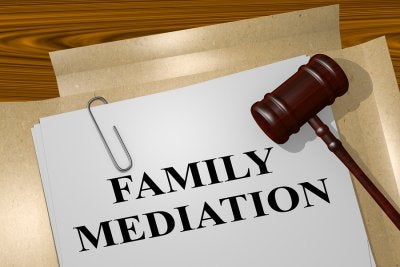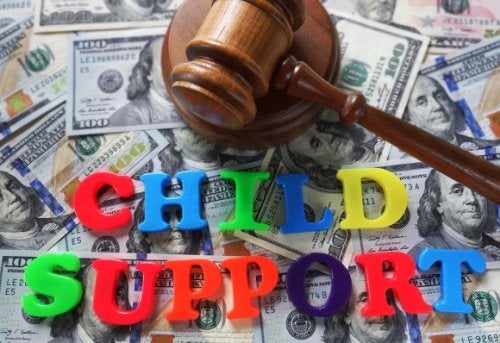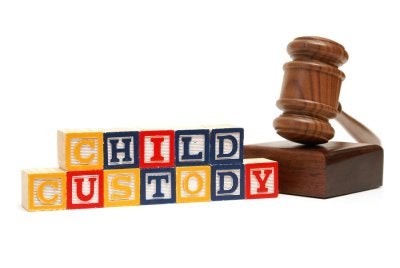-
Consensual Adoption

Consensual adoption usually represents a happy day and the best of circumstances. When a stepparent who has been raising a child gets to adopt that child and become their parent, officially and legally, the whole family has cause for celebration.
Steps to Consensual Adoption
First, the prospective parent files a Petition for Adoption. What happens next depends on consent. Consent means the biological parent has agreed to give up their parental rights and allow the proposed adoption to go forward. If there is no consent attached to the petition, the court issues a Show Cause Order. It is sent to the parent who is being asked to grant consent.
After being served, the parent who has been issued the Show Cause Order has thirty days to respond to that order. This is one of those situations in law where time is of the essence, and there is no wiggle room for procrastinators. In the absence of a response within 30 days, it is considered to mean consent is given. If you are planning to withhold consent, it is vital to reply and to make sure your reply reaches the court within the thirty-day window.Open vs. Closed Adoption
In a closed adoption, the biological parent no longer has parental rights. They may have been given up voluntarily or taken from them as a result of a “fitness” test. They do not have visitation rights nor the right to have any say in the rearing of the child.
In an open adoption, the biological parent may be granted limited access to the child going forward, as agreed by the two parties. Both parties will agree on when and under what conditions the parent has access to information about the child as he or she grows up, may visit the child, or have the ability to contact them.The Role of Mediation in Consensual Adoption
You may be wondering why you need an attorney or mediator if everything is agreed upon. The truth is, when it comes to matters of family law, such as adoption, it’s essential to have a legal and binding agreement. It’s also important to have a professional who is aware of all the issues involved in an adoption, whether it’s an open or closed adoption.
Put simply, people tend to change their minds over time. What they agree to today, they may challenge in the future. Having legal rights in this situation will prevent confusion in the future.
Things are different today than they were in the past. Through genetic family tracing, people are finding out as adults that the people he/she through were their parents are not actually their parents. Furthermore, parents who gave up all rights to children when they are young are having a person show up in their inbox or on their doorstep, asking if they are their biological parents.A mediator has the experience to know all the issues which can help create a durable plan for what happens in the future. A mediator can help both the adoptive parents to begin addressing these issues now, including suggestions of when the child may need counseling to address the age-old question of “Who am I?”
Why I’m Your Best Choice for a Mediator in Your Adoption Case
I’m a trained mediator, an attorney for children, and an attorney for parents. I’ve seen too many adversarial scenarios and the effect it has on the kids. Adoption through mediation is peaceful and best for everyone, from the individual to the whole family. Rely on my experience and care to guide you through the process with a minimum of drama and the best possible outcome.
-
Settling Will Disputes with Mediation
In the Baltimore area, mediation is commonly used to settle disputes. This venue is appropriate for virtually all types of disputes , including those concerning inheritances. Often, these family conflicts arise when a will isn’t sufficiently specific about which items will go to which heirs or when the heirs are left confused about why the decedent made certain decisions. By turning to a mediation lawyer instead of resorting to litigation, families can maintain discretion while sorting through these matters. Ideally, mediation will also help preserve familial relationships.
During a mediation session for a will dispute, the mediator will strive to read between the lines. These disputes aren’t always about financial gain; heirs may argue over a particular item because of its sentimental value. Mediators cannot enforce binding agreements, but they can propose solutions that the heirs might not have thought of by themselves. Mediation enables heirs to work through their differences and agree to a compromise that will benefit each party.

-
What Is Probate?
Legal matters are often complex and confusing in the wake of a loved one’s death. It’s highly recommended that you consult an estate lawyer in Baltimore to guide you through the probate process. Probate is the process by which a will is legally recognized, an executor or personal representative is appointed, and the assets are distributed. In some cases, probate can be completed relatively easily and quickly. In other cases, such as when a will is contested, the matter can drag on for months.
After a person dies, a probate lawyer will ask that the court legally recognize the will and appoint the executor that the decedent named. If the person died without a will, then the judge can appoint someone. The executor is responsible for taking an inventory of the decedent’s assets and debts, and for identifying the beneficiaries. The executor will need to settle the decedent’s outstanding debts before distributing the remaining assets to the beneficiaries in the manner specified in the will.

-
Finding Your Birth Parents
Individuals who were adopted often have many questions about their birth parents . It isn’t always possible to uncover the identities of the birth parents, especially if it was a closed adoption. However, the first step is to consult a lawyer in Baltimore. A lawyer can guide you through the process of filing consent for contact and a waiver of confidentiality with the Department of Social Services. If your birth parents have also filed this paperwork, then the identities can be disclosed. In many cases, however, mutual consent is not given.
Watch this video to find out what you can do if the adoption was closed and mutual consent is not given. This professional explains that you can have a lawyer petition the court to open the records. In the petition, you must provide compelling reasons why the court should open the records. For example, you may need information about your birth parents for medical reasons.
-
Preparing for Post-Divorce Mediation to Modify Child Support or Custody
It’s often expected that a divorce agreement will resolve family law issues beyond a shadow of a doubt. But in fact, many disputes can arise months or years after the divorce agreement was signed. For example, one party may wish to change the custody agreement or child support arrangement. If this applies to your situation, you can consult a mediation lawyer in Baltimore . He or she may recommend post-divorce mediation. Being well prepared for your mediation sessions can help you get the most out of them.

Gather Documents
Ahead of your first mediation session, you should gather together documents that are relevant to the case. Your lawyer can provide guidance on which specific documents or evidence will be useful for achieving your goals. For example, if you wish to increase the child support payments you’re receiving, you may need evidence that demonstrates that the child’s financial needs are increasing. These might include medical bills or receipts for extracurricular activities. Perhaps you wish to modify the visitation schedule. For example, you might argue that your child’s grades are declining because of the back-and-forth visitation during the week days. Gather together your child’s report card, progress reports, notes from teachers, and similar evidence.
Prepare Proposals
You likely already have a clear idea of what you would like to accomplish in post-divorce mediation. But it can be even more helpful to put your proposal into writing. For example, you might develop one or more alternative schedules of visitation. If you want your child with you during the entire week, you’ll need to be prepared to increase visitation during other times such as school vacations, holidays, and weekends. Understand that it’s unlikely that your proposal will be accepted exactly as is. However, it can provide a good starting point for the discussion.
Adjust Your Mindset
Before going into mediation, your lawyer may counsel you to adjust your mindset. Mediation is intended to resolve conflicts in a mutually agreeable way . It’s expected that parties involved with mediation may not be on the best of terms, but entering mediation with a confrontational mindset is counterproductive. Remind yourself that you’ll have to be willing to compromise to make progress. You might even identify areas where you’re willing to compromise before your session with the mediator.
-
The Rights of Noncustodial Parents
Noncustodial parents do not have physical custody of a child, but are often granted visitation rights and still maintain certain responsibilities, such as providing child support. When custodial and noncustodial parents disagree, it’s important to understand your rights as a noncustodial parent and how they affect your stance during visitation, custody, or child support mediation in Baltimore.
In this video, you will learn more about the rights of noncustodial parents. If you are meeting resistance from the custodial parent when you attempt to co-parent your child, an attorney specializing in family law can help. Filing a petition in court or seeking mediation will ensure that your rights regarding visitation, phone calls, and access to your child’s records are upheld.
-
How Can I Pay Child Support in Maryland?
Child support consists of monetary contributions paid by a noncustodial parent to the custodial parent to provide for a child’s daily needs. Following a divorce or paternity ruling, a judge will typically determine the amount of child support required in Baltimore using state guidelines that take into account income, healthcare costs, alimony payments, and other potential costs for daycare, schooling, and other daily necessities. Child support payments are made by the noncustodial parent to the custodial parent via wage attachment, which deducts the child support payment directly from the noncustodial parent’s paycheck. It is the noncustodial parent’s responsibility to ensure these payments are made on time, regardless of his current employment status, as well as if he becomes incarcerated or disabled. The custodial parent receives these payments directly, so long as she is not receiving Temporary Cash Assistance, or TCA. If the custodial parent is receiving TCA, child support payments are kept by the state and considered reimbursement for TCA benefits.

-
What Is Interstate Child Support Enforcement?
In family law, an interstate child support case refers to a support order between two parents who live in different states. For example, the custodial parent might live in Maryland and the noncustodial parent might live in Virginia. Sometimes, enforcing a child support order in Baltimore can be difficult when the other parent lives across state lines.
However, as you’ll learn by watching this video, all states have laws that allow for the enforcement of interstate child support orders. If the other parent does not pay his or her child support obligations, you can seek the counsel of a family law attorney. Your attorney may petition the court to enforce the support order. The court can take a number of enforcement actions, perhaps including issuing a wage garnishment order against the non-paying parent.
-
Preparing for a Custody Evaluation
When a child custody and visitation case is contested, the family law judge in Baltimore may order a custody evaluation. A custody evaluator will meet with each parent and the child, along with other relevant parties such as social workers and psychologists. Custody evaluators can also visit each home to make observances about family life. The end result is a written report that the family law judge will use when making a custody and visitation decision. If you’re anticipating a meeting with a custody evaluator, it’s important to sit down with your family law attorney and discuss what you should and shouldn’t do.

Talking to Your Child
The family law evaluator will ask to speak with your child. Many parents are unsure of how to inform their kids of the upcoming appointment. Depending on the age of your child, you could inform him or her that a psychologist wants to talk to him or her about living with mom or dad. However, it’s of the utmost importance to avoid coaching the child on what you want him or her to say. Not only will the family law evaluator be able to discern this, it will likely confuse your child and may have lasting psychological effects.
Knowing How to Answer Questions
Your attorney will likely advise you to practice good listening skills during your conversation with the custody evaluator . Pay attention to what the evaluator is asking you and answer only that question-nothing more. Answer truthfully about your current living situation and your background. If you’re not sure about a question, don’t hesitate to ask for clarification. The evaluator will appreciate your cooperativeness and willingness to get the facts right.
Discussing Sensitive Areas
It’s likely that the custody evaluator will ask you some sensitive questions, such as questions about your strengths and weaknesses as a parent. It’s best not to try to portray yourself as the best parent in the world-the evaluator will see through this. Similarly, try to resist the temptation to portray the other party as a completely incompetent parent. Do acknowledge the other parent’s strengths and weaknesses, and acknowledge the importance of your child having positive, ongoing relationships with both parents.
-
What Is a Children’s Trust?
A children’s trust can be a useful estate planning tool for families with small children. It allows parents to leave assets to children while controlling the age at which they have access to them. Your estate lawyer in Baltimore can help you decide if this kind of trust could be right for you.
With a children’s trust, benefactors assign assets to a trust for a child and identify a trustee to control the assets until the child reaches an age set by the benefactor. For instance, while estate planning, parents may decide to set up a trust for their toddler and name a close relative as the trustee. The trust says that the child cannot control the inheritance until they reach age 18. If both parents are deceased before the child reaches 18, he or she receives the trust but the trustee manages it as directed by the parents. If both parents are deceased after the child reaches 19, he or she receives the inheritance without the involvement of the trustee.
Children’s trusts put many parents’ minds at ease while estate planning. Your estate lawyer can guide you through the process of establishing your trust.


